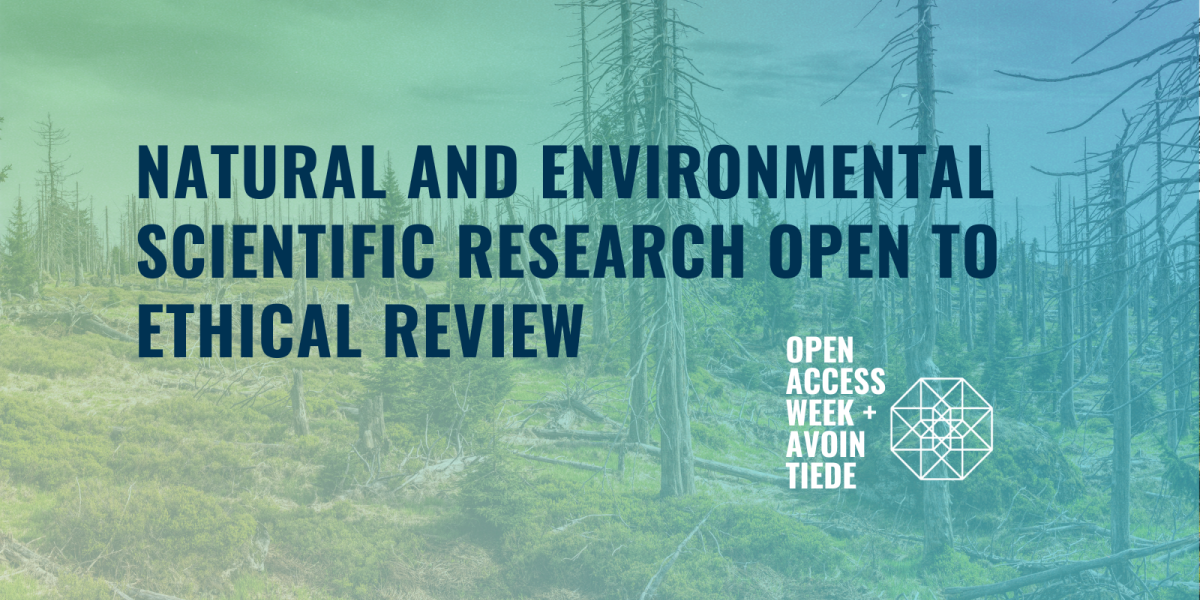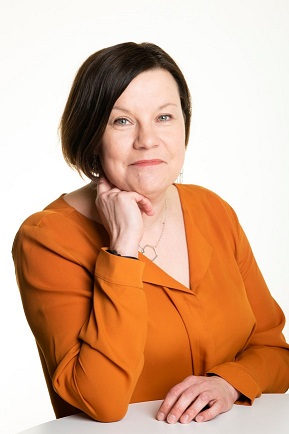
What are the prospects for the ethics of natural and environmental scientific research? To find out, we interviewed Sirpa Thessler, Vice-President of TENK and Director of the Natural Resources Unit at LUKE.
Environmental sciences seek answers to challenges that threaten the vitality and diversity of the environment and organisms. However, the effects of scientific research on living creatures and environments are not always straightforward. The ethical principles of human sciences at national level assess the impact that research has on the well-being of the people involved. A discussion on ethics and openness related to natural and environmental sciences is currently underway in the Finnish and international scientific community. A deeper examination of openness and ethics in environmental sciences creates opportunities for the renewal of the operating culture to become more sustainable.
 We asked Sirpa Thessler, Vice-Chair of the Finnish National Board on Research Integrity and Director of Natural Resources Unit at the Natural Resources Institute Finland, what should be taken into account in the ethics of natural and environmental research, as well as the links that the question of ethics has with the openness of science and climate justice. Thessler’s work combines a strong mix of both the ways in which scientific research is carried out and the introduction of environmental information as a basis for societal debate for both decision-makers and citizens.
We asked Sirpa Thessler, Vice-Chair of the Finnish National Board on Research Integrity and Director of Natural Resources Unit at the Natural Resources Institute Finland, what should be taken into account in the ethics of natural and environmental research, as well as the links that the question of ethics has with the openness of science and climate justice. Thessler’s work combines a strong mix of both the ways in which scientific research is carried out and the introduction of environmental information as a basis for societal debate for both decision-makers and citizens.
Ethical evaluation can prevent significant harm to the environment
In autumn 2022, Finnish National Board on Research Integrity maps the need for prior ethical assessment and ethical principles at national level in the fields of bio, environmental, science and engineering research in Finland. Research on the environment, nature or part thereof is included in the scope of the study. The framework for the review has been outlined in the European Union’s “do no significant harm” principles, which should not cause significant harm to nature or the environment in research projects funded by the EU Recovery and Resilience Facility (RRF). The DNSH evaluation ensures that the project does not harm the following environmental objectives:
- Climate change mitigation
- Climate change adaption
- The sustainable use and protection of water and marine resources
- The transition to a circular economy
- Pollution prevention and control
- The protection and restoration of biodiversity and ecosystems
Changing values in society also affects research
“Research must respond to changes in social values,” Thessler says. For example, animal rights are of wider interest to people in Finland than before. “It is for the benefit of researchers to provide support and structures to reflect on these issues,” Thessler emphasizes. “Society needs experimental research. In order for it to continue to be possible, there must be mechanisms to do it as well as possible." However, there is a learning process ahead. According to Thessler, ethical evaluation is new in natural sciences. Before the review is put into practice, there is still to be considered, for example, in defining the evaluation in terms of the timeframes of the impact of the study and how the process can be implemented," Thessler says.
Openness and ethics go hand in hand at different stages of research. The opening of environmental data is partly made easier by a smaller amount of partially sensitive personal data compared to, for example, human sciences. However, accurate location data on nests or plant habitats of endangered animal species, for example, should be kept securely, causing restrictions on their full transparency. Overall, data openness also makes research more ethical: “Opening data will speed up and promote the wider use of information, which will help to implement solutions in general. Of course, it is also an ethical angle that resources are used as efficiently as possible. This way part of them can be used elsewhere," Thessler thinks. However, Thessler also points out that opening up information requires resources and structures: “Often the image is that information is just being opened, but it also needs to be well documented, described and organized, for example.” At the Natural Resources Institute Finland, the openness of data is constantly being developed: “All of our data is not yet open, but we are moving in that direction.”
Producing information at the heart of social debate
According to Thessler, the Natural Resources Institute Finland (LUKE) plays a role in social discussion as a data producer, which is often also involved in the core of the discussions. The forestry, wildlife and agriculture at the heart of their work are of broad interest to citizens, and the public debate on these topics is fierce. “It is important that all participants in the debate have the same knowledge base, at least roughly that positions can be taken.”
The availability of open, accessible and comprehensible scientific information is a key factor in the sustainability and democratic nature of the debate on the state of the environment. According to Thessler, it is very important that a solid knowledge base is also used in the political debate, so that public debate is not based on mere opinions. Thessler points out that the relationship between experiential knowledge and research knowledge is not straightforward or always easy, even for researchers: “Experience-based knowledge can be quite hefty, easily weighing more in argumentation than research data, sometimes even for researchers when going outside their own fields.”
Climate crisis is unequal also in Finland
What about climate justice? The climate crisis is closely intertwined with questions of societal justice in Finland, affecting different communities in varying ways. People working in agriculture or reindeer husbandry, for example, can experience climate change in their daily lives and livelihoods more strongly than a person working in an office. Vulnerable sectors suffer more than others. Of course, it’s different than elsewhere, where floods and human lives can be involved, for example," Thessler said. However, the problems of climate justice must also be taken into account in Finland. According to Thessler, openness can contribute slowly but surely to the realization of climate justice, as knowledge and solutions to adapt to and mitigate the climate crisis spread across the globe. “It surely doesn't make it more difficult,” Thessler says. Openness and ethical review are the pillars of sustainable research.
Interview: Jonni Karlsson
The text: Jonni Karlsson & Anni Rastas
The article is part of the Open Science + Open for Climate Justice series of the Open Science Secretariat and the International Open Access Week. In addition to the article series, the social media accounts of the Open Science Secretariat make social media posts from the content of the article series during the week.
Read also:
Environmental Research Does Not Turn Into Political Action by Itself


